by Lisa Cooke | Apr 8, 2015 | 01 What's New, Norwegian, Video
MyHeritage is a leading resource for Scandinavian genealogy research. Now they are offering a free webinar for those researching Danish, 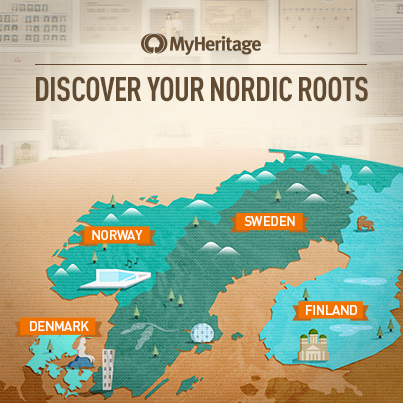 Finnish, Norwegian, Swedish and Icelandic ancestry.
Finnish, Norwegian, Swedish and Icelandic ancestry.
On Wednesday, April 15, Mike Mansfield, MyHeritage Director of Content and Jason Oler, MyHeritage Senior Program Manager, will host a program packed with research tips and strategies for navigating the millions of Scandinavian genealogy records now on MyHeritage. Click here to register.
Ready to learn about Scandinavian genealogy NOW? Genealogy Gems Premium members can access Premium Podcast Episode #15, in which Lisa interviews Scandinavian research expert Ruth Mannis at the Family History Library. Ruth simplifies and clarifies the process and reassures us that everyone can have success finding their Scandinavian roots. If you’re not a Premium member yet, you’re missing out on gems like Ruth Mannis’ interview–and more than 100 more premium podcasts like these and dozens of genealogy video tutorials. Get a year’s access
to all of this for one low price. Click here to learn more.
by Lisa Cooke | Apr 21, 2015 | 01 What's New, Adoption, African-American, Book Club, DNA, Genealogy Gems Podcast, Genealogy TV
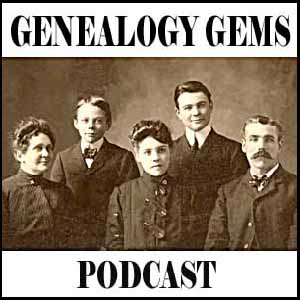 The latest episode of the free Genealogy Gems podcast (Episode 178) has been released and it’s PACKED with gems you can use now to inspire your family history!
The latest episode of the free Genealogy Gems podcast (Episode 178) has been released and it’s PACKED with gems you can use now to inspire your family history!
 First, nationally-renowned genetic genealogist CeCe Moore joins me on the show to talk about using DNA for genealogy research, adoption, and the Finding Your Roots with Henry Louis Gates, Jr. TV show.
First, nationally-renowned genetic genealogist CeCe Moore joins me on the show to talk about using DNA for genealogy research, adoption, and the Finding Your Roots with Henry Louis Gates, Jr. TV show.
I love CeCe’s analogy of using different DNA test providers to “fish in different ponds.” She talks about using different types of genetic tests (autosomal, y-DNA or mDNA) to chase answers to specific genealogy research questions, and the importance of using test results together, not in isolation. Because autosomal DNA is coming onto so many people’s radar, I ask her to explain that in more depth–its uses and its limitations. CeCe shares her favorite tips for people who are getting started and gives us lots of great buy gout medication examples, including a helpful example for African-Americans who are trying to identify a genetic ancestor (who may also have had a slaveholder relationships with the family).
 Also in this episode, we announce the newest featured title in the Genealogy Gems Book Club: The Lost Ancestor (The Forensic Genealogist)
Also in this episode, we announce the newest featured title in the Genealogy Gems Book Club: The Lost Ancestor (The Forensic Genealogist) by British author Nathan Dylan Goodwin. Listen to the episode to hear what this mystery novel is about and why we chose it.
by British author Nathan Dylan Goodwin. Listen to the episode to hear what this mystery novel is about and why we chose it.
Finally, I share some fantastic new record sets that are online now and ready for you to explore, and a Genealogy Gems listener shares an important update on adoption records in Ohio.
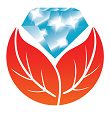 Click here to listen to the free Genealogy Gems Podcast episode 178. Click here to learn more about this free podcast and see an archive of past episodes. We recently celebrated more than 1.5 million downloads of our podcasts!
Click here to listen to the free Genealogy Gems Podcast episode 178. Click here to learn more about this free podcast and see an archive of past episodes. We recently celebrated more than 1.5 million downloads of our podcasts!
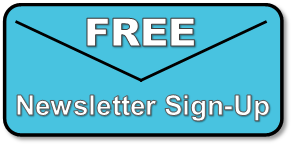
by Lisa Cooke | Apr 16, 2015 | 01 What's New, British, Findmypast, images, Records & databases
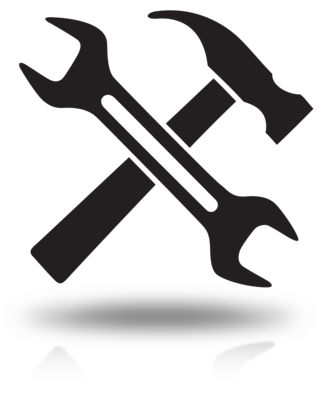 Do you have ancestors who may have been part of a British Trade Union? They could have been carpenters, joiners, cabinetmakers, lithographic artists, engravers, printers, paper makers, railway servants, watermen, bargement, lightermen, woodworkers, newspaper proofreaders, school teachers, compositors, printers, boilermakers and even local government workers. Explore these new British Trade Union records at findmypast:
Do you have ancestors who may have been part of a British Trade Union? They could have been carpenters, joiners, cabinetmakers, lithographic artists, engravers, printers, paper makers, railway servants, watermen, bargement, lightermen, woodworkers, newspaper proofreaders, school teachers, compositors, printers, boilermakers and even local government workers. Explore these new British Trade Union records at findmypast:
British Trade Union Membership Registers are now available to browse–257 volumes of them! According to FindMyPast, “These consist of digitized images of original records books from nine different unions. The documents [like admission books, annual reports and membership lists] include details about individual members that can enrich your genealogical research such as payments made, benefits received, names of spouses, profiles of leading members, directories of secretaries and details of Union activities and proceedings.”
Britain, Trade Union Members, Service and Casualties is a new related dataset with over 61,000 entries. It contains the details of members from 18 different unions. The records are a collection of union documents from the war years and do not solely feature individuals who participated in the First World War. The records include daily trade union news and business and frequently acknowledge members who have left for war or joined the services. Many include pages of the union’s Roll of Honour and some include photographs of the members or feature short profiles about specific members. The most extraordinary of the records is the Workers’ Union Record, which regularly features full pages of photographs of service men.
 Here’s a tip: Obituaries can be an excellent source of information about an ancestor’s working life. Click here to see an example of my own relative’s working life in his obituary. Click here to read more about finding recent obituaries, which are coming online in droves (by the million, in newly-indexed and/or digitized format). Learn more about finding obituaries (online or offline) in Lisa Louise Cooke’s book Find Your Family History in Newspapers, available in print or e-book editions.
Here’s a tip: Obituaries can be an excellent source of information about an ancestor’s working life. Click here to see an example of my own relative’s working life in his obituary. Click here to read more about finding recent obituaries, which are coming online in droves (by the million, in newly-indexed and/or digitized format). Learn more about finding obituaries (online or offline) in Lisa Louise Cooke’s book Find Your Family History in Newspapers, available in print or e-book editions.
by Lisa Cooke | Apr 17, 2015 | 01 What's New, Australian, British, Canadian, Conferences, images, RootsTech, Technology, United States
 Were you among the record-breaking audience of 23,918 attendees at RootsTech 2015 in Salt Lake City, Utah? Even if you were, chances are you didn’t catch all the top talks.
Were you among the record-breaking audience of 23,918 attendees at RootsTech 2015 in Salt Lake City, Utah? Even if you were, chances are you didn’t catch all the top talks.
RootsTech staffers have announced that over 1000 FREE regional RootsTech events, called RootsTech Discovery Days, will be hosted around the world throughout 2015. “Select sessions and planning resources from RootsTech 2015 have been recorded, translated in 10 languages, and made available online to support…local volunteer organizers,” says a media statement.
“By the first week following the conference, 65 local family discovery day events had already been held, including 27 in Latin America, one in Korea, and another in the Philippines. Over 1,000 more events are expected to be held throughout 2015, significantly extending the reach and impact of this popular conference.”
Click here to search for a RootsTech Family Discovery Day event near you. We notice that there plenty of options across the U.S. and in England, Canada, Australia and South Africa. Where do YOU want to look for an event?

Lisa speaks to a packed audience at RootsTech 2015.
by Lisa Cooke | Dec 14, 2014 | 01 What's New, Evernote
So many of you are harnessing the organizing and storage power of Evernote for family history research (and probably everything else you know!). Every time I teach on Evernote, a round of excited follow-up questions follows. Here are two great questions from Karen:
Q: The handwriting app on my phone is way cool, yet Evernote doesn’t seem to recognize any of the words. I thought it would apply OCR to the handwriting. Is that just a premium feature?
A: The key to handwriting OCR is to print clearly. OCR can not read cursive. Also, if you created your handwritten note and then immediately tried to search for a keyword, (and the note was printed clearly) it may not have found it because you searched before it had a chance to sync through the cloud and apply OCR. If you’re in a hurry, click the SYNC button in Evernote. Also, Premium accounts sync and apply OCR faster than free ones.
Q: My husband has a single note file that he has been putting all his daily notes in for years – currently about 14mb. Once he has uploaded that file, then when he makes additional notes to it each day, will he be “charged” for the entire file being saved again or just the incremental portion?
A: No he won’t be using 14 mb of upload each time he saves it. The key here is “upload.” You are charged uploading for the first time you upload the item to Evernote. I believe that if he adds a paragraph that is 1kb of text to the note the next day, he will only have 1kb deducted from his monthly upload.
One word of caution, if he has a desire to some day publish a book or some other project with his daily notes, I wouldn’t recommend Evernote. As you saw, the export file types are limited, and it does not export directly to Word or .txt. However, if he just wants it for his one record keeping, I think Evernote is a great solution.
Resources
How to Get Started in Evernote, and the Ultimate Evernote Education
Genealogy Gems Premium members can also access exclusive full-length videos on how to use Evernote for family history, like:
 Finnish, Norwegian, Swedish and Icelandic ancestry.
Finnish, Norwegian, Swedish and Icelandic ancestry. 

 First, nationally-renowned genetic genealogist CeCe Moore joins me on the show to talk about using DNA for genealogy research, adoption, and the Finding Your Roots with Henry Louis Gates, Jr. TV show.
First, nationally-renowned genetic genealogist CeCe Moore joins me on the show to talk about using DNA for genealogy research, adoption, and the Finding Your Roots with Henry Louis Gates, Jr. TV show.




